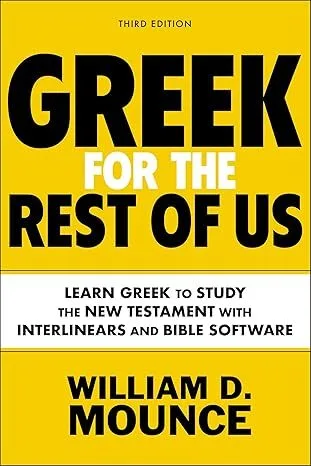Strong’s G3899: A compound verb combining παρα (alongside) with πορεύομαι (to go/travel), meaning “to pass by/along.” In the New Testament, it often carries deeper significance than mere physical movement, frequently occurring in contexts of judgment, mockery, or divine purpose, particularly in the Passion narrative.
U- Unveiling the Word

Key Information
παραπορεύομαι

Strong’s Entry
g3899
παραπορεύομαι represents more than simple physical movement – it often carries theological weight in its New Testament usage. The word appears notably in the crucifixion narrative, where those who “passed by” weren’t merely walking past but were actively participating in mocking Christ. The compound structure emphasizes deliberate movement alongside something, suggesting intentional interaction. Early church fathers often used this word to highlight how people position themselves in relation to Christ – either passing by in mockery or walking alongside in discipleship.
N – Necessary Information
- Greek Word: παραπορεύομαι, paraporeuomai, /par-ap-or-YOO-om-ahee/
- Detailed pronunciation: par (as in ‘parking’) + ap (as in ‘apt’) + or + YOO (as in ‘you’) + om + ahee
- Part of Speech: Verb
Etymology:
- παρα- (para-): alongside, beside
- πορεύομαι (poreuomai): to go, travel, journey
- -μαι (-mai): middle/passive voice ending
D – Defining Meanings
- To pass by or along
- To travel beside
- To go past
For compound words:
παρα- indicates movement alongside or beside something, while πορεύομαι conveys the basic idea of traveling or journeying. The middle voice ending -μαι suggests personal involvement in the action.
Translation Options:
- “To pass by” – emphasizes the transient nature of the action
- “To walk alongside” – highlights the parallel movement aspect
- “To go past” – captures both movement and positional relationship
E – Exploring Similar Words
- διέρχομαι (dierchomai) /dee-ER-khom-ahee/ – to pass through rather than alongside
- περιπατέω (peripateō) /per-ee-pat-EH-oh/ – to walk around, often with less directional focus
- παράγω (paragō) /par-AG-oh/ – to pass by, but with less emphasis on deliberate movement
R – Reviewing the Word’s Morphology
As a verb, παραπορεύομαι exhibits these features:
- Tense: Present/Imperfect
- Voice: Middle/Passive
- Mood: Indicative/Subjunctive
- Person: 1st, 2nd, 3rd
- Number: Singular/Plural
- Aspect: Progressive/Continuous
Example morphological changes:
παραπορεύομαι (I pass by)
παραπορεύῃ (you pass by)
παραπορεύεται (he/she/it passes by)
S – Studying Lexicon Insights
BDAG emphasizes the spatial aspect of passing alongside something, while Thayer’s notes its frequent use in contexts of deliberate observation. LSJ provides evidence of its use in classical Greek for both literal and metaphorical passing by. Vine’s highlights its significance in the crucifixion narrative. Moulton and Milligan note its common usage in travel documents and official papers.
T – Tracing the Scriptures
First appearance:
“And those who [παραπορεύομαι] passed by derided him, wagging their heads” (Matthew 27:39)
Additional References:
Mark 2:23, Mark 9:30, Mark 11:20, Mark 15:29
A – Analyzing Classical Usage
| Author: Work | Text |
|---|---|
| Xenophon: Anabasis | “The army [παραπορεύομαι] passed by the walls of the city” |
| Polybius: Histories | “As they [παραπορεύομαι] passed along the coast, they observed the enemy’s fleet” |
| Strabo: Geography | “Travelers [παραπορεύομαι] passing by this region often stop to view the temple” |
N – Noteworthy Summary
παραπορεύομαι combines physical movement with intentional positioning, often carrying theological significance in its New Testament usage. Its appearance in the crucifixion narrative particularly emphasizes the deliberate nature of those who passed by and mocked Christ.
D – Did You Know?
- The word appears most frequently in Mark’s Gospel, reflecting his emphasis on movement and action
- Its use in the crucifixion narrative creates a powerful contrast with disciples who are called to follow Christ rather than pass by
- The middle voice form suggests personal involvement in the action, emphasizing conscious choice in how one passes by
[Lexicon Summary]
A compound verb combining παρα (alongside) with πορεύομαι (to go/travel), meaning “to pass by/along.” In the New Testament, it often carries deeper significance than mere physical movement, frequently occurring in contexts of judgment, mockery, or divine purpose, particularly in the Passion narrative.
Part of speech: Verb
Tags: #verb #movement #crucifixion #mockery #compound_word #biblical_greek #new_testament #passion_narrative #mark_gospel #matthew_gospel
Note: While this entry strives for accuracy, readers engaged in critical research should verify citations and keyword occurrences in their Bible translation of choice. For Biblical citations, the F.O.G Bible project recommends Logos Bible software.
Strong's g3899




